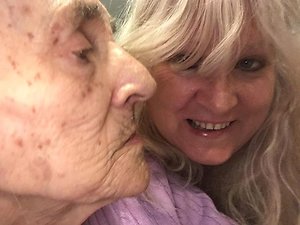
FAQ
FAQS
What is live in care?
It is the presence of a person who will keep you in their awareness throughout the day and stay with you overnight to maintain your safety where necessary, assisting you with your daily activities.
Are you familiar with my health condition?
Conditions I have worked with in various arenas
•
Cognitive impairments ;Learning disability, congenital or acquired brain injury, ASD, dementia and cognitive difficulty associated with disorders such as Huntingdon disease, MS and other neurological disorders
•
I have also worked extensively within private mental health care across all of the classified conditions and difficulties.
Within live-in-care
•
Mild-moderate Dementia
•
MS
•
Physical injuries resulting from falls
•
Conditions associated with immobility such as pressure care and other skin conditions
Own home or Care home…..?.......
How does live in care differ from a care home?
Being at home means different things to us all but generally home seems to be the place in which we thrive.
In Dementia and in general the familiarity of layout and personal belongings is crucial to wellbeing
The amount of time a live-in-carer can devote to you is many times in excess of and will enable you more individuality than may be possible in a residential home
Activities
Can you help my relative with their interests?
I help people with activities, for example, where illness or disability may have impeded that. Sometimes the kitchen has become out of bounds owing to mobility issues, however I regularly do cooking activities by bringing things to the table or armchair with a tray.
I have found there are lots of armchair exercises on YouTube such as Tai Chi or easy Yoga or even dance. Sometimes Scrabble or similar is enjoyed and I am skilled at adapting this for cognitive impairment when possible.
During Covid when churches have been shut I have co-created a service-at-home with church materials which were added to with YouTube hymns and prayers.
Access to the community
If a person wants to get outdoors I am a keen walker and wheelchair pusher.
I have accompanied clients to many activities, such as classes, cinema, out for coffee. Obviously this is not so simple recently with PPE requirements but hopefully opportunities will open up shortly.
How can we keep everyone on the same page?
Medication and visiting professionals
I am experienced in assisting people to take medications and used to liaising with anyone else involved in the person’s care and supporting appointments. This is often easier in the live-in situation where there is greater continuity of care. I am also experienced at handovers and ‘passing the baton’ to an incoming carer.
What about food intolerances ??
Diet
I am experienced at cooking to dietary requirements such as gluten-free, dairy-free, vegetarian, vegan and type 2 diabetes
I have experience of creating pureed meals with attention to appearance and in also assisting people to eat whether that is prompting or actual feeding. I have limited experience at peg-feeding.
Downtime?
Whilst there are often times when less physical activity or tasked activity is happening, this is, across the day to be expected when a day can start at 7am. However, live in care is a job of vigilance. If the person having care is vulnerable enough to need continuous human presence, the person caring for them is keeping engaged and attentive at a psychological level. This means their brain is never at rest and splitting attention to do another focussed task is impossible in my experience. For example, as I write I am sitting with a client and I managing just a few words before my attention returns to the client.
Skillset and training?
The person alongside the client may be supporting the client at a seemingly simple level, however that person is skilled, often very skilled and trained and that skill is informing them in their vigilance toward the client over the long periods of engagement.
Live-in-Care is a profession rather than a lifestyle choice. I have a busy home and life away from work and deliver care on ‘short-burst’ basis or rolling rota rather than long term basis.
As you will see I am trained to degree/health professional level and keep various training such as First Aid, Moving and Positioning and Medication up to date.
Currently I am enrolled to an End of Life course with a particular interest in Soul Midwifery.
Charges
What am I paying for?
Payment is for 24 hours of engagement per day. At the National Minimum wage this would equate to £209.28 per day (£258.00 London living wage) and is therefore heavily discounted.
My charges, which have not changed since 2018, in order to accommodate families with the understandable strain of economic recession and now Covid 19 are:
£125 per 24 hour period which equates to £5.20 p/h
I do not charge for night-calls since sleep cannot be replaced by money. Obviously If there is sleep deprivation the break must be extended for safety.
(In many situations night calls are charged at anything between £11 and £15)
Breaks
The industry standard is a minimum 2 hour break per day. It is important to understand that, whilst living-in, carers still need to administrate their own lives.
The break is obviously used as the carer needs and it must be possible to leave the house.
It can often be the case that a client is considered to be on the boundary and can be left alone…
As a carer this is a tricky situation. If a client is vulnerable enough to need a 24 hour carer then it is likely that vulnerability does not pause whilst the carer takes their break. It is more likely that the carer feels they can’t rest their mind, cannot go where they wish and cannot absorb themselves in actually having a break.
It happens that families even request mobile phones switched on. This means the carer is simply working remotely- which isn’t a break.
In every live-in situation I have needed to be flexible, for example, using my breaks to sleep, working remotely because I am not confident the client is really okay. I do not mind and am able to see where genuine and unavoidable difficulties are occurring. However, this shouldn’t be the rule and if it is, something is wrong. Care is in place over 168 hours and a minimum of 14 hours per week equates to just over 8% free time. By contrast most people’s non-work time is in excess of 70% in a week.
Where a carer repeatedly feels the need to responsibly compromise their break or sleep in their break or otherwise be impeded from 2 hours to manage their own commitments and wellbeing, a charge of £15 p/h is applied.
If the client is likely to be at risk during the break a relief carer needs to be in place and to be competent enough to call 111 or emergency services before calling the live-in carer or family. If I was needed during my break I would endeavour to respond-and this has happened several times during placements- but I may not have my attention on my phone or even hear it if I am otherwise occupied and carers do not have to work remotely during breaks.
How do we put together a live-in-care arrangement?
It is definitely possible to craft a rewarding lifestyle for the client over a sustained period and it works best when there is good carer/family teamwork
Naturally, with the steep costs involved there is tension about affordability and I really understand this, having older relatives whose care I also help get in place.
Dwindling inheritance and the lack of attention to the Adult Social Care Act has placed families, particularly those dealing with dementia, in an almost intolerable position and so you have my heartfelt understanding.
It is important to be able to get in place the right conditions, as I’ve spoken of, since resentment over pay , breaks and ‘downtime’ can create misunderstanding.
How do we get started?
I find it most useful to have an email or something I can look at, detailing how you would like the work completed and what areas of assistance the client needs.
Between this and my terms and conditions we come to an agreement about how to deliver the care and keep to my terms and conditions with as much mutual understanding as possible.
Covid 19?
I have worked throughout Covid 19 taking all the usual precautions; minimal essential contact with the outside world along with physical distancing and masks when out. I have also driven to work rather than use public transport.
At work the same precautions apply, although I wear a mask only when visiting professionals come.
I have sanitised all goods inwards, according to recommendations, including at the peak of the virus, requesting visitors to leave outer clothing outside the door in a bag. I am working on the premise that ‘we don’t know’, that is to say there are many and conflicting theories as to virus transmission and therefore I am doing all of the above just in case.
At present there is no certain way of knowing if you have had the virus , since antibody tests may still not show this, Covid tests are really only as effective as the day they are taken and it would be possible to have a clear test and still contract it as soon as you leave the test centre. It is possible to be an asymptomatic carrier.
There is no absolutely guarantee of non-transmission and we can only operate within the conditions mentioned at present, as effectively as possible.
I have tested negative for antibodies recently and that could indicate my precautions have been effective.
Tonbridge
Kent
